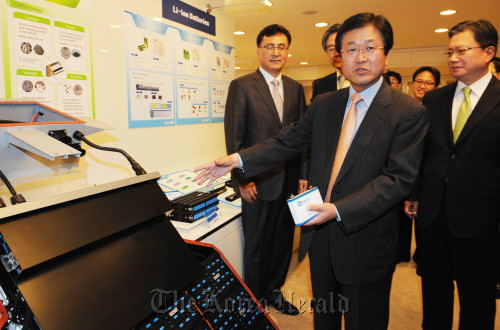Samsung SDI, on Wednesday vowed to become a global energy firm catering to future needs for recyclable energy marking the official takeover of the solar battery business from its sister firm, Samsung Electronics.
With the $147.6 million swap, SDI said it will target annual revenues of 13 trillion won ($12.1 billion) in 2015 and up to 35 trillion won in sales by 2020.
More than half of the sales, according to the SDI chief executive Park Sang-jin, were to come from its battery unit including electric car batteries.
“Based on our existing battery business and the newly added solar battery business, we hope to evolve into an all-around eco-friendly energy company,” Park told reporters.
 |
Samsung SDI chief executive Park Sang-jin discusses the company’s new business strategy during a meeting with a group of reporters in Seoul on Wednesday. (Park Hyun-koo/The Korea Herald) |
Samsung SDI, historically a display maker, has since 2000 been developing lithium ion batteries to shift its business focus to renewable energy.
It has now received solar batteries under its wing, a business Samsung Electronics has been tasked with since 2009.
“Our goal is to become the world’s top company in both electric and solar batteries, and we will be certain to demonstrate the plausibility of this objective within the next three to five years,” Park said.
Global industries, particularly those consuming fossil fuels, have been avidly ramping up efforts to tap into renewable energy in the face of climate-related challenges.
The automobile industry has been conspicuously heading the movement, with more than 14 percent of global cars expected to be replaced with hybrid cars by 2020.
So far, LG Chem has been leading the race for manufacturing electric car batteries, with the company pledging to secure 4 trillion won in battery sales by 2015.
Industry watchers said in time, Samsung SDI could catch up, based on both its own technology and extensive affiliate support.
SDI currently, however, has only a single client ― BMW ― to its name and is in talks with Volkswagen AG to clinch an additional deal.
LG Chem, on the other hand, has 10 global companies it supplies to.
Samsung SDI is currently in negotiations for EV battery supply in China and India, but the CEO declined to elaborate.
Solar batteries were one of the five areas that Samsung owner Lee Kun-hee called for Samsung to foster to create new revenue sources.
The four other areas were hybrid car batteries, light-emitting diodes, biomedicine and medical equipment.
Among other affiliates, Samsung Fine Chemical produces polysilicon, Samsung Corning Presicision Materials produces ingots and wafers while Samsung Everland builds solar plants.
By Kim Ji-hyun (
jemmie@heraldcorp.com)








